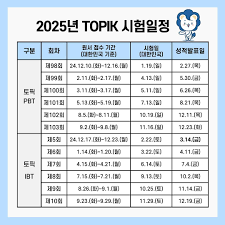
Hello future Korean speakers! 👋 If you plan to pursue higher education, employment, or long-term residence in South Korea, achieving a certified score on the Test of Proficiency in Korean (TOPIK) is mandatory. TOPIK is the standardized measure of your reading, writing, and listening abilities. Getting organized early is key to success! I've prepared a comprehensive guide detailing the structure, scoring, and essential registration tips for 2025. Let's master this test! 📝
1. TOPIK Structure: Levels, Scores, and Purpose 🎯
TOPIK is divided into two exams, TOPIK I (Beginner) and TOPIK II (Intermediate/Advanced), covering six total proficiency levels (Level 1 to 6). Your target level depends entirely on your academic or professional goal.
Most Korean universities require TOPIK Level 3 or 4 for undergraduate admission and Level 4 or higher for graduation or graduate school admission.
Evaluation Criteria (Minimum Scores Required)
| Level | Exam Type | Minimum Score | Proficiency Goal |
|---|---|---|---|
| Level 3 | TOPIK II | 120 / 300 | Practical daily conversation and general social functions. |
| Level 4 | TOPIK II | 150 / 300 | Academic/Professional communication and comprehending general news. |
| Level 5 | TOPIK II | 190 / 300 | High proficiency for research and professional tasks. |
| Level 6 | TOPIK II | 230 / 300 | Near-native fluency with no major communication difficulty. |
2. 2025 TOPIK Test Schedule and Registration 🗓️
In South Korea, the TOPIK exam is usually administered six times a year, allowing multiple opportunities to test. International test schedules vary significantly by country and availability, often running 3-5 times annually. Always confirm the local schedule via your country's Korean Embassy or Cultural Center.
2025 Domestic TOPIK Schedule (South Korea)
| Test No. | Test Date (Sun) | Registration Period (KST) | Results Date |
|---|---|---|---|
| 93rd | January 12 | Dec 3 - Dec 9, 2024 | Feb 13 |
| 95th | April 13 | Feb 11 - Feb 17 | May 22 |
| 97th | July 13 | May 13 - May 19 | Aug 13 |
| 98th | October 12 | Aug 5 - Aug 11 | Nov 12 |
Registration periods are extremely short and competitive, often lasting only one week. You must register online immediately at the start time (KST) via the official TOPIK website to secure a test slot in Korea.
3. Preparation Strategy and Necessary Skills ✍️
Preparation should be strategic, focusing on the most challenging sections, especially for TOPIK II, which includes the complex writing portion. The writing section often serves as the biggest barrier to achieving Level 4 or higher.
Key Skill Focus Areas
- Writing (TOPIK II): Dedicate significant time to practicing the long essay (Question 54). Focus on structuring arguments logically and using advanced connecting phrases and grammar.
- Listening/Reading Speed: Both sections require fast comprehension. Use official past papers to train your mind to process longer, academic texts and rapid dialogue within the strict time limits.
- Vocabulary Expansion: Focus heavily on Sino-Korean vocabulary (words derived from Chinese characters), which dominate the academic and technical sections of the TOPIK II reading materials.
Conclusion: Your Gateway to Korea 📝
The TOPIK score is your official proof of ability and your passport to academic and professional success in South Korea. While challenging, proper planning and consistent practice will help you achieve your required score.
Utilize the official resources on the TOPIK website (www.topik.go.kr) for past papers and preparation materials. Start preparing now and target one of the early test dates in 2025! Good luck! If you have specific questions about preparation, ask away! 😊
TOPIK Examination Essentials
Frequently Asked Questions ❓




